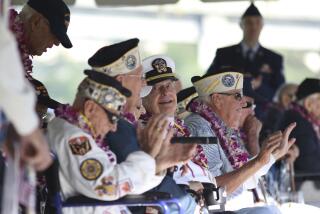World War II’s Doolittle, ‘America’s Hero,’ Turns 95
- Share via
PEBBLE BEACH, Calif. — His memory is going, his hearing nearly gone. But as Gen. Jimmy Doolittle turned 95 on Saturday, he still had his prized view--the Pacific Ocean, a backdrop for one of the defining moments of the desperate battle to defeat the Japanese during World War II.
The former stunt pilot planned and led the daring “30 Seconds Over Tokyo” bombing raid in April, 1942, the United States’ surprise answer to the Japanese attack on Pearl Harbor four months earlier.
The B-25 bomber raid brought U.S. might to bear on the Japanese mainland for the first time, boosted America’s sagging morale and put Japan on the defensive.
“His raid was the first good news of World War II for America. People could hold their heads high again after the shock of Pearl Harbor,” says C.V. Glines, author of the 1964 book, “Doolittle’s Tokyo Raiders” and co-author of Doolittle’s autobiography, “I Could Never Be So Lucky Again,” published in September by Bantam.
The historic assault has faded from the nation’s collective memory, but the raid and Doolittle have endured as symbols of American heroism under fire.
At 5-foot-4 and 145 pounds, Doolittle wasn’t central casting’s idea of “America’s hero.” But he commanded attention and he was a scrapper. Born in Alameda on Dec. 14, 1896, his parents took him to Alaska for a decade at the turn of the century as his father followed the Gold Rush.
“When he entered a room you just felt he was in charge,” Glines says. “He liked to say he was 5-foot-6, though. He said it sounded better.”
Doolittle, who says his memories are fading, doesn’t give interviews anymore and won’t be attending a birthday celebration today at Ft. Ord in nearby Monterey. But he still answers correspondence, signs requested autographs and keeps up with current events.
“He’s never really been one to talk much about himself,” says Doolittle’s son John, who built an addition to his seaside home here so his father can spend his final days near the ocean. Doolittle’s wife, Josephine, died Christmas Eve, 1988, on their 71st wedding anniversary.
“He’s proud of what he did during his life,” John Doolittle says. “But he doesn’t call himself a hero.”
On April 18, 1942, Doolittle and his 79 fellow raiders had good reason to fear. It was the first time B-25s would take off from a carrier, and the bombers had only enough fuel to drop their one-ton loads.
Then-Lt. Col. Doolittle planned the raid so the B-25s could land at a Chinese airfield. But Japanese fishing boats spotted the USS Hornet about 650 miles from Japan. Although 200 miles short of the designated takeoff point, the B-25s left early to avoid detection.
The bombers hit Tokyo and four other cities, not causing much damage but surprising Japanese leaders, who had said that U.S. forces couldn’t reach their country from American bases.
“It wasn’t a suicide mission because they hoped to land somewhere, anywhere. But 15 crews either bailed out or crash-landed,” says Glines.
Doolittle and 66 others came down in unoccupied China or the Soviet Far East and eventually made their way back to U.S. forces. But five men drowned or were killed when they parachuted. Eight others landed in Japanese-held China and were imprisoned, three to be executed as war criminals and a fourth to die in prison. The four survivors among those eight came home after the war.
Doolittle was awarded the Medal of Honor and was promoted to general. He was granted four-star status in 1985 by President Reagan, who called Doolittle “my personal hero.”
“He was the bravest man I’ve ever known, but he never offered any words of wisdom about surviving so long,” John Doolittle says. “He hasn’t even said anything about turning 95. It’s just another landmark to him.”
More to Read
Get the L.A. Times Politics newsletter
Deeply reported insights into legislation, politics and policy from Sacramento, Washington and beyond. In your inbox twice per week.
You may occasionally receive promotional content from the Los Angeles Times.










